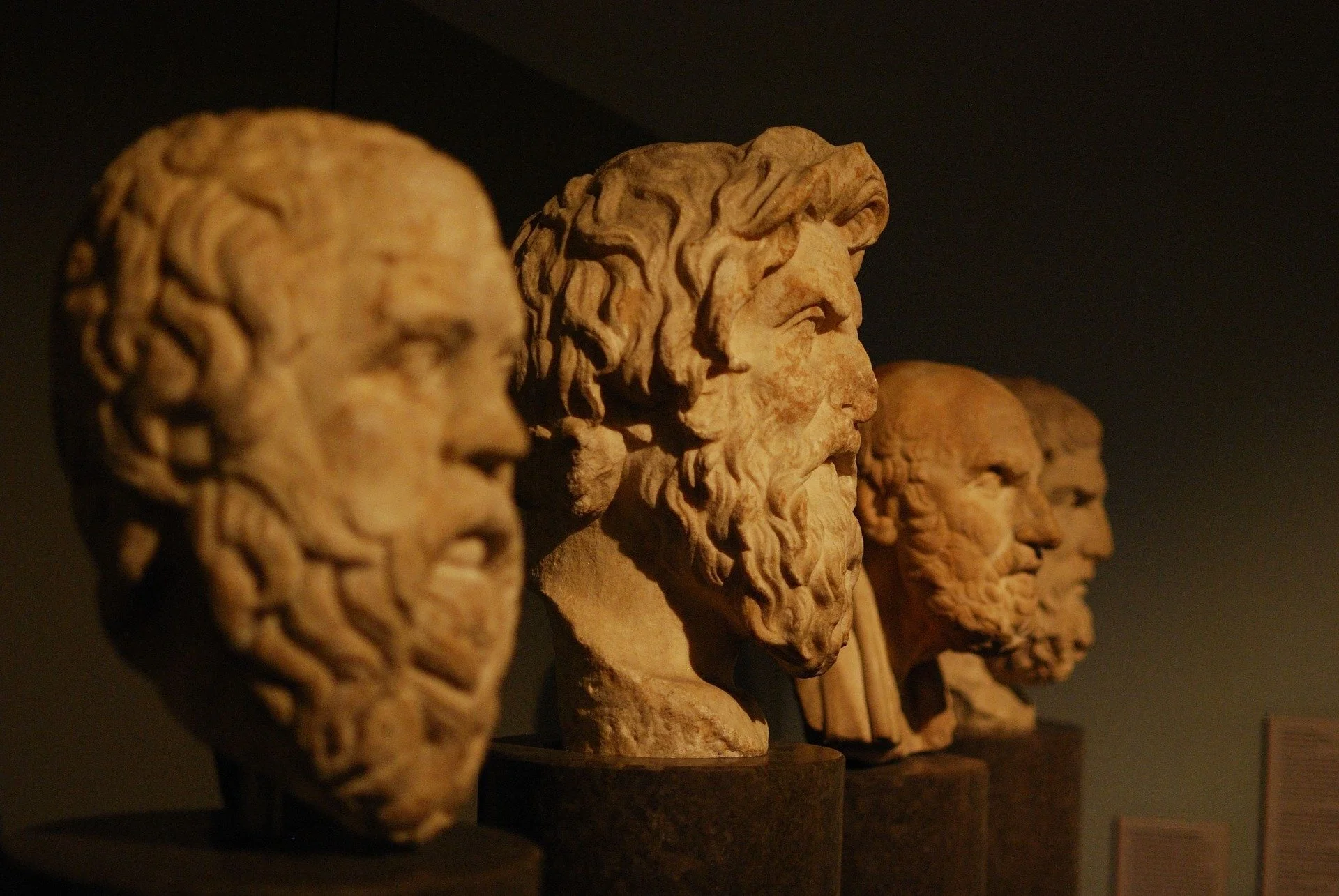Street Philosophy: Jordan Klepper as a Modern-Day Socrates
As any student of the history of philosophy knows, the Ancient Greek philosopher Socrates was known for using what is now known as the “Socratic method” to question his fellow citizens, exposing that they really didn’t know the things they claimed to know. The goal of the Socratic method is twofold:
To zero in on the truth of the matter—i.e., the essential definitions of the terms and concepts in question.
To allow one’s interlocutor to see the irrationality—however obvious or subtle—inherent to his or her own position and arguments.
Irrationality abounds today, from the Big Lie about 2020 U.S. presidential election spread by former President Donald Trump and his followers, to the arguments of the anti-vaxxers and aski-maskers in the wake of the COVID pandemic, to conspiracy theories of all sorts ranging from the flat-earth movement to the deep state and the QAnon conspiracy theories (if they can even properly be called “theories,” which I doubt).
With so much irrationality seemingly omnipresent in the cultural milieu today, it’s worthwhile to spend time thinking about the best way to make an impact arguing against such blatantly ridiculous viewpoints—viewpoints that are often so confidently expressed that their proponents somehow often manage to succeed in making more rational, well-informed people appear to be the irrational ones, especially when we are truly stultified and aghast at the brazen display of illogic and ignorance before us.
I recently stumbled upon the following video of comedian Jordan Klepper chatting (arguing? debating?) with participants at an anti-mask rally in Johnston County, North Carolina:
This clip is ostensibly comedic, in the same way that Plato’s dialogues are amusing as we delight in seeing Socrates expose the illogic of the ignorant citizens of Athens. It occurred to me as I was watching this clip that Jordan Klepper is serving a highly useful role in today’s society, a role that is analogous to the role that Socrates played in Ancient Athenian society (and with about the same success rate!): attempting to expose the inherent illogic to the proponents of irrational views with the goal of genuinely trying to change people’s minds by getting them to realize their own ignorance, with prompting and questioning that I would describe as genuinely Socratic.
Ten years ago, before the Trump Era, before the COVID pandemic, and before the rise of the QAnon movement, I never would have characterized comedians, news reporters, late night talk show hosts, or news anchors as serving a Socratic role in society. Yet this is exactly what seems to have developed: well-informed people of good conscience, and with the power of their respective microphones, using their influence to carry on discussions that are genuinely Socratic in character, attempting to be the voice of reason when faced with a seemingly insurmountable pile of irrationality encroaching from all sides and on multiple fronts.
Do we rational folks—the folks who oppose Donald Trump and his threat to our American democratic republic, who are in favor of the COVID vaccine and mask-wearing for the sake of protecting ourselves and our fellow citizens and human beings, who don’t subscribe to the deep state and/or QAnon conspiracy theories, and who know the earth is round—have any reason for being optimistic in light of all the above and in light of Jordan Klepper’s mostly unsuccessful attempt at playing Socrates to the illogic of the anti-maskers at the rally in the video above?
Sadly, I think irrationality is on the rise with no end obviously in sight. There will always be a division between the knowledgeable and the ignorant, in any society, which is as true today as it was in Ancient Greece and as it was in the Dark Ages, with medieval monks doing their best to keep genuine culture alive despite the cultural darkness of the times in which they found themselves. Some time ago I came to view myself as a type of 21st-century philosophical monk, doing my best to keep rationality and western culture alive in the new digital, social, cultural, and political dark ages that have descended upon us, a dark age that seems to be joyfully welcomed by right-wing religious folks who have always had a deep streak of irrationality running through their worldview, a subset of a broader American irrationalism that has always been present in American society in any time period.
And although we intelligent ones fight against the joint darknesses of ignorance, fear, power, and manipulation in our own classrooms, newsrooms, television studios, podcast studios, and sometimes on the street as Jordan Klepper is doing, I’m not at all optimistic that the effort will pay off in any way other than it did for Socrates or for the average medieval monk—fighting the good fight against the intellectual degeneracy of the times in which they find themselves but unable to make a real impact until the dawn of a new enlightenment, an enlightenment that strikes me today, as a write this, as a long time in coming in the future.
So we rational ones write, discuss, argue, broadcast, and play Socrates in our own little corners of the the irrational world around us, in our own little spheres of influence, hoping that it makes an impact with even a handful of people whose minds we can influence and change for the better. We modern-day Socrateses are indeed fishers of men, not for an ultra-right-wing religious worldview that has been shown to be highly destructive and highly manipulable this past years and decades, but for the sake of rationality, literacy, culture, the health of our American democratic republic, and for the common good in every sense.
As a philosophy teacher, I know that most of my lessons will fall on deaf—even hostile—ears, just as the prisoners in Plato’s Allegory of the Cave (Republic) ridiculed their former fellow prisoner who stumbled his was back into the darkness to attempt to free his friends from their intellectual chains still binding them, and just as the anti-maskers talking to Jordan Klepper in the above video were remarkably confident about the certainty of their own videos even when directly faced with their own illogic, making him out to be the irrational one for asking questions that were so opposed to their own confidently irrational worldview. So it seems we have little reason to think we rational ones will ever make an impact with people en masse, perhaps only in isolated cases where we can genuinely be successful in one-on-one Socratic conversations, changing minds one person at a time.
As I write this, I am struck that there is a deeply Wittgensteinian component to conspiracy theories in general and to the worldviews I have characterized as problematic here: Trumpers, anti-vaxxers, anti-maskers, QAnon believers, etc. According to Wittgenstein, we are always weighing new information against the backdrop of our prior beliefs, some of which are peripheral to our worldview and open to future revision, and some of which are more central to our worldview and less open to revision.
As I see it, the problem, then, has become that some beliefs that are simply factually untrue have become so embedded into the worldviews of their proponents that even genuinely rational/factual counter-evidence debunking their views is dismissed out of hand instead of being counted as evidence. The strange thing is that this isn’t even itself a necessarily irrational move. After all, we all weigh new evidence in light of our prior beliefs and in light of prior evidence. The, in reality, do we ever do anything else? The difference today seems to be the rigidity to the way in which proponents of these specious worldviews clutch on to the core tenets of their irrational beliefs and never even entertain the possibility of revising their core assumptions—an intellectual trap, admittedly, that anyone with strong convictions is in constant danger of falling into.
One of the hallmarks of a genuinely philosophical temperament, of a genuinely rational and intelligent person, is the openness to new evidence—openness to the possibility of being wrong and the need to revise one’s beliefs, to slaughter our own intellectual sacred cows when our core assumptions turn out to be incorrect. As the philosopher and historian of science Thomas Kuhn has pointed out, given his own broadly Wittgensteinian approach to the history of science, the openness to revising one’s fundamental assumptions is responsible for all of the major paradigm shifts in the history of science: the Copernican revolution with its shift from a geocrentric model of the solar system (with its postulation of very-appealing-but-dead-wrong ptolemaic epicycles) to a heliocentric model of the solar system, the shift from newtonian physics to relativistic physics, the development of quantum mechanics (yet to be reconciled with relativistic physics), and so on.
But when faced with such blatant illogic and lack of openness to counter-evidence, we modern-day Socrateses are at a loss for how to make an impact with these folks in any way other than harkening back to Socrates’s own approach: using dialogue and dialectic to allow others to see their own errors, their own latent contradictions, and their own factual or conceptual errors. But just as Socrates was seen as a corruptor of the youth of Athens, we rational ones are so very often viewed as the ridiculous ones by those who are themselves paragons of illogic and irrationality, fully confident in their convictions but dead-wrong factually, conceptually, scientifically, or culturally. Yet, despite our lack of success, we 21st-century Socrateses will keep up the fight against irrationality and illogic wherever we see it, one person at a time, trying our best not to be disheartened as we keep rationality alive and wait for a new Age of Enlightenment that may never come.







